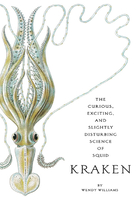THE SNAIL-WATCHER
When Mr. Peter Knoppert began to make a hobby of snail-watching, he had no idea that his handful of specimens would become hundreds in no time. Only two months after the original snails were carried up to the Knoppert study, some thirty glass tanks and bowls, all teeming with snails, lined the walls, rested on the desk and windowsills, and were beginning even to cover the floor. Mrs. Knoppert disapproved strongly, and would no longer enter the room. It smelled, she said, and besides she had once stepped on a snail by accident, a horrible sensation she would never forget. But the more his wife and friends deplored his unusual and vaguely repellent pastime, the more pleasure Mr. Knoppert seemed to find in it.
"I never cared for nature before in my life," Mr. Knoppert often remarked-he was a partner in a brokerage firm, a man who had devoted all his life to the science of finance-"but snails have opened my eyes to the beauty of the animal world."
If his friends commented that snails were not really animals, and their slimy habitats hardly the best example of the beauty of nature, Mr. Knoppert would tell them with a superior smile that they simply didn't know all that he knew about snails.
And it was true. Mr. Knoppert had witnessed an exhibition that was not described, certainly not adequately described, in any encyclopedia or zoology book that he had been able to find. Mr. Knoppert had wandered into the kitchen one evening for a bite of something before dinner, and had happened to notice that a couple of snails in the china bowl on the draining board were behaving very oddly. Standing more or less on their tails, they were weaving before each other for all the world like a pair of snakes hypnotized by a flute player. A moment later, their faces came together in a kiss of voluptuous intensity. Mr. Knoppert bent closer and studied them from all angles. Something else was happening: a protuberance like an ear was appearing on the right side of the head of both snails. His instinct told him that he was watching a sexual activity of some sort.
The cook came in and said something to him, but Mr. Knoppert silenced her with an impatient wave of his hand. He couldn't take his eyes from the enchanted little creatures in the bowl.
When the ear-like excrescences were precisely together rim to rim, a whitish rod like another small tentacle shot out from one ear and arched over toward the ear of the other snail. Mr. Knoppert's first surmise was dashed when a tentacle sallied from the other snail, too. Most peculiar, he thought. The two tentacles withdrew, then came forth again, and as if they had found some invisible mark, remained fixed in either snail. Mr. Knoppert peered intently closer. So did the cook.
"Did you ever see anything like this?" Mr. Knoppert asked.
"No. They must be fighting," the cook said indifferently and went away. That was a sample of the ignorance on the subject of snails that he was later to discover everywhere.
Mr. Knoppert continued to observe the pair of snails off and on for more than an hour, until first the ears, then the rods, withdrew, and the snails themselves relaxed their attitudes and paid no further attention to each other. But by that time, a different pair of snails had begun a flirtation, and were slowly rearing themselves to get into a position for kissing. Mr. Knoppert told the cook that the snails were not to be served that evening. He took the bowl of them up to his study. And snails were never again served in the Knoppert household.
That night, he searched his encyclopedias and a few general science books he happened to possess, but there was absolutely nothing on snails' breeding habits, though the oyster's dull reproductive cycle was described in detail. Perhaps it hadn't been a mating he had seen after all, Mr. Knoppert decided after a day or two. His wife Edna told him either to eat the snails or get rid of them-it was at this time that she stepped upon a snail that had crawled out on to the floor-and Mr. Knoppert might have, if he hadn't come across a sentence in Darwin's Origin of Species on a page given to gastropoda. The sentence was in French, a language Mr. Knoppert did not know, but the word sensualité made him tense like a bloodhound that has suddenly found the scent. He was in the public library at the time, and laboriously he translated the sentence with the aid of a French-English dictionary. It was a statement of less than a hundred words, saying that snails manifested a sensuality in their mating that was not to be found elsewhere in the animal kingdom. That was all. It was from the notebooks of Henri Fabre. Obviously Darwin had decided not to translate it for the average reader, but to leave it in its original language for the scholarly few who really cared. Mr. Knoppert considered himself one of the scholarly few now, and his round, pink face beamed with self-esteem.
He had learned that his snails were the freshwater type that laid their eggs in sand or earth, so he put moist earth and a little saucer of water into a big wash-bowl and transferred his snails into it. Then he waited for something to happen. Not even another mating happened. He picked up the snails one by one and looked at them, without seeing anything suggestive of pregnancy. But one snail he couldn't pick up. The shell might have been glued to the earth. Mr. Knoppert suspected the snail had buried its head in the ground to die. Two more days went by, and on the morning of the third, Mr. Knoppert found a spot of crumbly earth where the snail had been. Curious, he investigated the crumbles with a match stem, and to his delight discovered a pit full of shiny new eggs. Snail eggs! He hadn't been wrong. Mr. Knoppert called his wife and the cook to look at them. The eggs looked very much like big caviar, only they were white instead of black or red.
"Well, naturally they have to breed some way," was his wife's comment. Mr. Knoppert couldn't understand her lack of interest. He had to go and look at the eggs every hour that he was at home. He looked at them every morning to see if any change had taken place, and the eggs were his last thought every night before he went to bed. Moreover, another snail was now digging a pit. And another pair of snails was mating! The first batch of eggs turned a greyish color, and miniscule spirals of shells became discernible on one side of each egg. Mr. Knoppert's anticipation rose to a higher pitch. At last a morning arrived-the eighteenth after laying, according to Mr. Knoppert's careful count-when he looked down into the egg pit and saw the first tiny moving head, the first stubby little antennae uncertainly exploring the nest. Mr. Knoppert was as happy as the father of a new child. Every one of the seventy or more eggs in the pit came miraculously to life. He had seen the entire reproductive cycle evolve to a successful conclusion. And the fact that no one, at least no one that he knew of, was acquainted with a fraction of what he knew, lent his knowledge a thrill of discovery, the piquancy of the esoteric. Mr. Knoppert made notes on successive matings and egg hatchings. He narrated snail biology to fascinated, more often shocked, friends and guests, until his wife squirmed with embarrassment.
"But where is it going to stop, Peter? If they keep on reproducing at this rate, they'll take over the house!" his wife told him after fifteen or twenty pits had hatched.
"There's no stopping nature," he replied good-humoredly. "They've only taken over the study. There's plenty of room there."
So more and more glass tanks and bowls were moved in. Mr. Knoppert went to the market and chose several of the more lively-looking snails, and also a pair he found mating, unobserved by the rest of the world. More and more egg pits appeared in the dirt floors of the tanks, and out of each pit crept finally from seventy to ninety baby snails, transparent as dewdrops, gliding up rather than down the strips of fresh lettuce that Mr. Knoppert was quick to give all the pits as edible ladders for the climb. Matings went on so often that he no longer bothered to watch them. A mating could last twenty-four hours. But the thrill of seeing the white caviar become shells and start to move-that never diminished however often he witnessed it.
His colleagues in the brokerage office noticed a new zest for life in Peter Knoppert. He became more daring in his moves, more brilliant in his calculations, became in fact a little vicious in his schemes, but he brought money in for his company. By unanimous vote, his basic salary was raised from forty to sixty thousand dollars per year. When anyone congratulated him on his achievements, Mr. Knoppert gave all the credit to his snails and the beneficial relaxation he derived from watching them.
He spent all his evenings with his snails in the room that was no longer a study but a kind of aquarium. He loved to strew the tanks with fresh lettuce and pieces of boiled potato and beet, then turn on the sprinkler system that he had installed in the tanks to simulate natural rainfall. Then all the snails would liven up and begin eating, mating, or merely gliding through the shallow water with obvious pleasure. Mr. Knoppert often let a snail crawl on to his forefinger-he fancied his snails enjoyed this human contact-and he would feed it a piece of lettuce by hand, would observe the snail from all sides, finding as much aesthetic satisfaction as another man might from contemplating a Japanese print.
By now, Mr. Knoppert did not allow anyone to set foot in his study. Too many snails had the habit of crawling around on the floor, of going to sleep glued to chair bottoms, and to the backs of books on the shelves. Snails spent much of their time sleeping, especially the older snails. But there were enough less indolent snails who preferred love-making. Mr. Knoppert estimated that about a dozen pairs of snails must be kissing all the time. And certainly there was a multitude of baby and adolescent snails. They were impossible to count. But Mr. Knoppert did count the snails sleeping and creeping on the ceiling alone, and arrived at something between eleven and twelve hundred. The tanks, the bowls, the underside of his desk and the bookshelves must surely have held fifty times that number. Mr. Knoppert meant to scrape the snails off the ceiling one day soon. Some of them had been up there for weeks, and he was afraid they were not taking in enough nourishment. But of late he had been a little too busy, and too much in need of the tranquillity that he got simply from sitting in the study in his favorite chair.
During the month of June he was so busy he often worked late into the evening at his office. Reports were piling in at the end of the fiscal year. He made calculations, spotted a half-dozen possibilities of gain, and reserved the most daring, the least obvious moves for his private operations. By this time next year, he thought, he should be three or four times as well off as now. He saw his bank account multiplying as easily and rapidly as his snails. He told his wife this, and she was overjoyed. She even forgave him the ruination of the study, and the stale, fishy smell that was spreading throughout the whole upstairs.
"Still, I do wish you'd take a look just to see if anything's happening, Peter," she said to him rather anxiously one morning. "A tank might have overturned or something, and I wouldn't want the rug to be spoilt. You haven't been in the study for nearly a week, have you?"
Mr. Knoppert hadn't been in for nearly two weeks. He didn't tell his wife that the rug was pretty much gone already. "I'll go up tonight," he said.
But it was three more days before he found time. He went in one evening just before bedtime and was surprised to find the floor quite covered with snails, with three or four layers of snails. He had difficulty closing the door without mashing any. The dense clusters of snails in the corners made the room look positively round, as if he stood inside some huge, conglomerate stone. Mr. Knoppert cracked his knuckles and gazed around him in astonishment. They had not only covered every surface, but thousands of snails hung down into the room from the chandelier in a grotesque clump.
Mr. Knoppert felt for the back of a chair to steady himself. He felt only a lot of shells under his hand. He had to smile a little: there were snails in the chair seat, piled up on one another, like a lumpy cushion. He really must do something about the ceiling, and immediately. He took an umbrella from the corner, brushed some of the snails off it, and cleared a place on his desk to stand. The umbrella point tore the wallpaper, and then the weight of the snails pulled down a long strip that hung almost to the floor. Mr. Knoppert felt suddenly frustrated and angry. The sprinklers would make them move. He pulled the lever.
The sprinklers came on in all the tanks, and the seething activity of the entire room increased at once. Mr. Knoppert slid his feet along the floor, through tumbling snail shells that made a sound like pebbles on a beach, and directed a couple of the sprinklers at the ceiling. This was a mistake, he saw at once. The softened paper began to tear, and he dodged one slowly falling mass only to be hit by a swinging festoon of snails, really hit quite a stunning blow on the side of the head. He went down on one knee, dazed. He should open a window, he thought, the air was stifling. And there were snails crawling over his shoes and up his trouser legs. He shook his feet irritably. He was just going to the door, intending to call for one of the servants to help him, when the chandelier fell on him. Mr. Knoppert sat down heavily on the floor. He saw now that he couldn't possibly get a window open, because the snails were fastened thick and deep over the windowsills. For a moment, he felt he couldn't get up, felt as if he were suffocating. It was not only the musty smell of the room, but everywhere he looked long wallpaper strips covered with snails blocked his vision as if he were in a prison.
"Edna!" he called, and was amazed at the muffled, ineffectual sound of his voice. The room might have been soundproof.
He crawled to the door, heedless of the sea of snails he crushed under hands and knees. He could not get the door open. There were so many snails on it, crossing and recrossing the crack of the door on all four sides, they actually resisted his strength.
"Edna!" A snail crawled into his mouth. He spat it out in disgust. Mr. Knoppert tried to brush the snails off his arms. But for every hundred he dislodged, four hundred seemed to slide upon him and fasten to him again, as if they deliberately sought him out as the only comparatively snail-free surface in the room. There were snails crawling over his eyes. Then just as he staggered to his feet, something else hit him-Mr. Knoppert couldn't even see what. He was fainting! At any rate, he was on the floor. His arms felt like leaden weights as he tried to reach his nostrils, his eyes, to free them from the sealing, murderous snail bodies.
"Help!" He swallowed a snail. Choking, he widened his mouth for air and felt a snail crawl over his lips on to his tongue. He was in hell! He could feel them gliding over his legs like a glutinous river, pinning his legs to the floor. "Ugh!" Mr. Knoppert's breath came in feeble gasps. His vision grew black, a horrible, undulating black. He could not breathe at all, because he could not reach his nostrils, could not move his hands. Then through the slit of one eye, he saw directly in front of him, only inches away, what had been, he knew, the rubber plant that stood in its pot near the door. A pair of snails were quietly making love in it. And right beside them, tiny snails as pure as dewdrops were emerging from a pit like an infinite army into their widening world.















